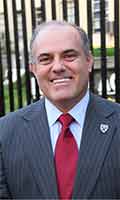Dr. Patrick Palmieri is leaving his footprint on healthcare in Peru.

Dr. Patrick Palmieri.
He moved to Peru for love, but now Dr. Patrick Palmieri’s connection reaches far beyond family ties. His wife, a native of Peru, convinced him that her country needed his medical knowledge and clinical expertise to improve its healthcare system. So he has spent nearly a decade in Peru working to advance evidence-based knowledge in clinical nursing practice. Here, Palmieri describes how his students benefit from his expertise as a contributing faculty member in the School of Nursing.
HOW HAS LIVING AND WORKING IN PERU SHAPED YOUR TEACHING? As a scholar focused on global nursing scholarship in Peru—through education, research, practice, and service—my perspective in our classroom is global. Because of my experience in South America, I push my students to think critically about their world, especially about how to work successfully in low- and middle-income national health sectors. When students are able to think of healthcare in a global context, the discussions are richer and the horizons become wider.
IN WHAT OTHER WAYS HAVE YOUR STUDENTS BENEFITED FROM YOUR WORK? Life in Peru has made community service part of my professional life. It’s also a personal passion. Whenever possible, I give or volunteer to support projects that promote social change. My wife and I created a microlending program where we loan $400 a month to a very bright girl from an economically challenged family so she can attend Peru’s best university. When she graduates, we’ll help her find a good job, and she’ll begin to repay the loan so we can repeat this process. On my website, my students read about these endeavors and seek my help to identify their own opportunities for service learning. I also help Walden faculty and students access volunteer opportunities working with vulnerable populations throughout South America.
WHAT DO YOU STILL HOPE TO ACCOMPLISH IN PERU? My achievements prove that a vision and hard work can create unbelievable results. For three years, I was often called gringo loco for thinking I could change what is costumbre in the health sector. Today there are seven accredited private hospitals in Peru. My goal is to continue advancing nursing science to improve healthcare quality and patient safety. Nursing is critical to gender equity and empowerment of women, improving maternal health and reducing child mortality. Educating new healthcare professionals is one key to achieving social change. This is where I will spend many hours and personal resources to make an impact. I want to leave my footprint, as well as the footprints of my friends and colleagues, on Peru.



